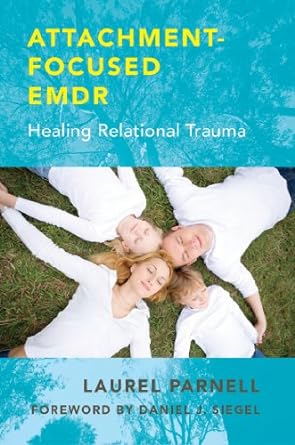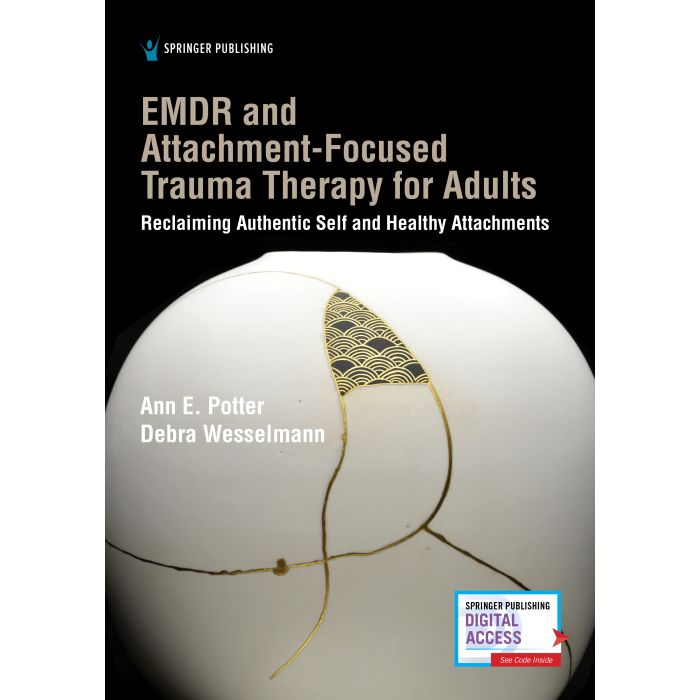Attachment-focused EMDR: Healing relational trauma
Integrating the latest in attachment theory and research into the use of EMDR.
Book Description
“Much has been written about trauma and neglect and the damage they do to the developing brain. But little has been written or researched about the potential to heal these attachment wounds and address the damage sustained from neglect or poor parenting in early childhood. This book presents a therapy that focuses on precisely these areas. Laurel Parnell, leader and innovator in the field of eye-movement desensitization and reprocessing (EMDR), offers us a way to embrace two often separate worlds of knowing: the science of early attachment relationships and the practice of healing within an EMDR framework. This beautifully written and clinically practical book combines attachment theory, one of the most dynamic theoretical areas in psychotherapy today, with EMDR to teach therapists a new way of healing clients with relational trauma and attachment deficits.
Readers will find science-based ideas about how our early relationships shape the way the mind and brain develop from our young years into our adult lives. Our connections with caregivers induce neural circuit firings that persist throughout our lives, shaping how we think, feel, remember, and behave. When we are lucky enough to have secure attachment experiences in which we feel seen, safe, soothed, and secure―the “four S’s of attachment” that serve as the foundation for a healthy mind―these relational experiences stimulate the neuronal activation and growth of the integrative fibers of the brain.
EMDR is a powerful tool for catalyzing integration in an individual across several domains, including memory, narrative, state, and vertical and bilateral integration. In Laurel Parnell’s attachment-based modifications of the EMDR approach, the structural foundations of this integrative framework are adapted to further catalyze integration for individuals who have experienced non-secure attachment and developmental trauma.
The book is divided into four parts. Part I lays the groundwork and outlines the five basic principles that guide and define the work. Part II provides information about attachment-repair resources available to clinicians. This section can be used by therapists who are not trained in EMDR. Part III teaches therapists how to use EMDR specifically with an attachment-repair orientation, including client preparation, target development, modifications of the standard EMDR protocol, desensitization, and using interweaves. Case material is used throughout. Part IV includes the presentation of three cases from different EMDR therapists who used attachment-focused EMDR with their clients. These cases illustrate what was discussed in the previous chapters and allow the reader to observe the theoretical concepts put into clinical practice―giving the history and background of the clients, actual EMDR sessions, attachment-repair interventions within these sessions and the rationale for them, and information about the effects of the interventions and the course of treatment.”
—Description from publisher
Book Access
Purchase/Subscription Required
Parnell, L. (2013). Attachment-focused EMDR: Healing relational trauma. New York, NY: W. W. Norton. https://wwnorton.com/books/9780393707458
- ISBN: 978-0393707458
Date
October 7, 2013
Creator(s)
Laurel Parnell
Contributor(s)
Elena Felder, Holly Prichard, Prabha Milstein, Nancy Ewing
Topics
Attachment
Extent
432 pages
Publisher
W. W. Norton
APA Citation
Parnell, L. (2013). Attachment-focused EMDR: Healing relational trauma. New York, NY: W. W. Norton. https://wwnorton.com/books/9780393707458
Audience
EMDR Therapists, Other Mental Health Professionals
Language
English
Content Type
Book
Access Type
External Resource





